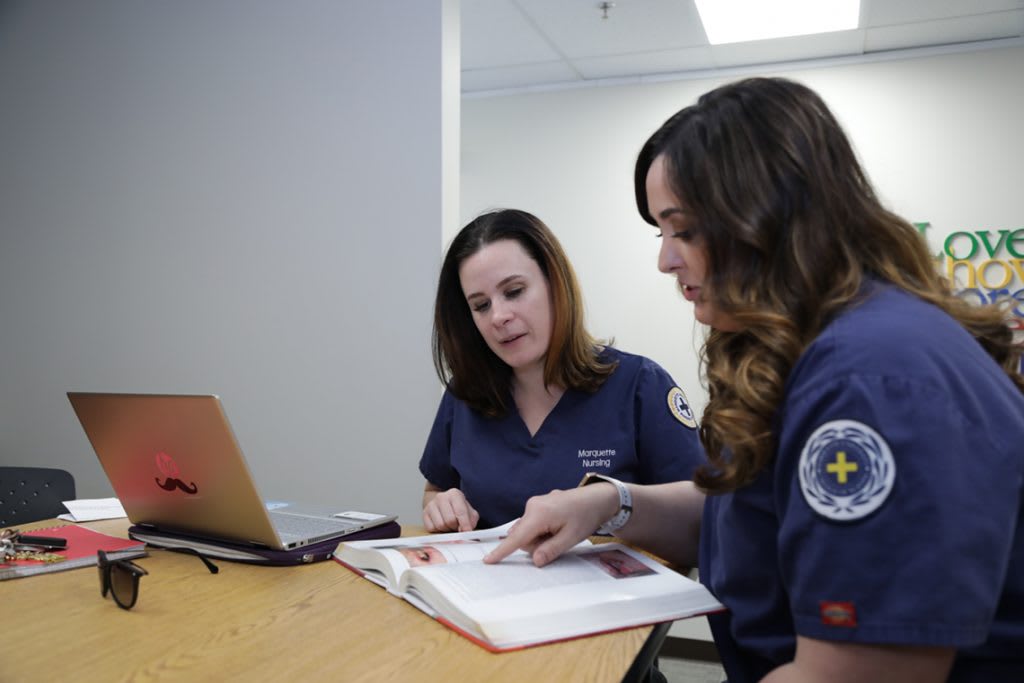What You Should Know About the New NCLEX-RN Exam
Each blog post is dated and contains accurate information as of that date. Certain information may have changed since the blog post publication date. If you would like to confirm the current accuracy of blog information, please visit our Direct Entry MSN overview page or contact admissions at (866) 891-8438.
The Next Generation NCLEX is coming, and as you prepare to take the new NCLEX, you should know why it is changing and how you can prepare. Components you can expect to change include question formatting and grading, emphasis on clinical judgement, and unfolding case studies.

On your path to becoming a nurse, you will doubtless work hard toward achieving your degree. Through Marquette University’s Master of Science in Nursing (MSN) Second Degree Direct Entry for Non-nurses program, you can graduate prepared to sit for your licensure exam in 19 to 21 months.
To practice as a registered nurse (RN), the final step in your nursing school journey is passing the licensure exam. Before you begin to prepare for the new NCLEX-RN licensure exam, you should understand the changes made to the test and how to pass the NCLEX-RN.
What Is the NCLEX Exam?
The National Council Licensure Examination for Registered Nurses, also referred to as the NCLEX or NCLEX-RN exam, is a test that nursing degree holders must pass before becoming an RN. As of April 2023, the Next Generation NCLEX-RN exam has launched and sets the standard prospective nurses must meet. In this updated test format, prospective nurses must answer questions with a slightly different conceptual focus while encountering new question formats. These changes are intended to better reflect nurses’ daily work and an individual’s critical thinking and decision-making skills. All these elements come together to raise the standard of nursing and ensure that everyone who passes the exam is as qualified as possible to practice as a nurse.
The test measures prospective nurses' clinical judgment as they evaluate presented scenarios and display their aptitude for analysis, problem-solving and evaluating outcomes. Through Marquette’s Direct Entry MSN program, you will gain the knowledge to succeed through online-based didactic coursework and practical, situational experience through on-site labs and clinicals.

Curious about the Direct Entry MSN program? Learn more about what to expect in nursing school.
Since the NCLEX-RN format has remained the same for so long, it might seem confusing why it is changing now. Let’s discuss what is changing and what you should be aware of before sitting for the exam.
Why the NCLEX-RN Exam is Changing
The NCLEX-RN has a long history of preparing nurses for their careers. Passing the exam has been a requirement for nurses to gain licensure in the US since 1994. With natural changes and evolutions in nursing, the National Council of State Boards of Nursing (NCSBN) updates the exam periodically. However, this is the first time the format has changed drastically.
Nurses are among the most essential individuals within our healthcare system, coordinating patient care with other medical team members and specializing across a variety of roles and practice areas. The new NCLEX-RN format is meant to refine and improve the exam, with a different emphasis and question format to better test factors deemed necessary to daily nursing practice.
What Makes the Next Generation NCLEX Different
While in the Direct Entry MSN program at Marquette, you will receive help preparing for the New NCLEX-RN format. However, that does not mean it will be easy or that you won’t have to do some research of your own. Here are some changes to the exam that you should be aware of before you begin studying.

Question Formatting
A goal of the Next Generation NCLEX-RN exam is to better evaluate critical thinking and knowledge through a variety of question types. The new range of question types includes the following:
- Extended Multiple Response
- Extended Drag and Drop
- Cloze (Drop down) Items
- Highlight Text
- Matrix/Grid
- Bowtie
- Trend
If you want to excel on the Next Generation NCLEX-RN, it is a good idea to familiarize yourself with the different question types and apply your knowledge on practice exams.
Scoring for Partial Credit
In the previous NCLEX-RN exam model, questions were either marked correct or incorrect. No partial credit was awarded for test items with multiple points. The Next Generation NCLEX-RN has been adjusted to allow partial credit for certain answers. The advantage of partial credit scoring is that it provides a more comprehensive look into an individual’s nursing skills and knowledge.

Remember that some questions will remain in an all-or-nothing style. Some scenarios, such as pairs, cannot be awarded potential credit and measured accurately.
Emphasis on Clinical Judgment
The NCSBN has developed a framework called the Clinical Judgement Measurement Model (NCJMM) to measure the effectiveness of practices and standardize judgment in a clinical setting. Data from over 200,000 NCLEX-RN candidates allows the NCSBN to use this model to accurately assess the clinical judgment skills of entry-level nurses taking the NCLEX-RN exam.
After all, these nurses will face the same high-stakes situations as veteran nurses, so they must demonstrate that they are prepared. Adjustments to the NCLEX-RN exam were made due to this research and the development of the NCJMM. Even if a student has all the necessary knowledge, they must be able to think clearly and make good decisions in potentially stressful scenarios.

Explore what doors are opened to you in your career with a Master’s in Nursing.
Unfolding Case Studies
Unfolding case studies replicate scenarios with patients where the information provided evolves over time. The nurse learner displays their judgment skills in an academic context by providing the best possible care given the information known at the time. These unpredictable scenarios demonstrate that the nurse can be adaptable and knowledgeable throughout the process.
You can expect the questions for unfolding case studies to include analysis of findings, speculation on patient responses, and clinical judgments on the best possible care for a situation.
Get Started with Marquette’s Direct Entry MSN Program
We at Marquette University’s Direct Entry MSN program can help you prepare for a career in nursing and the new NCLEX-RN exam. Our program is designed for anyone who has previously completed a non-nursing bachelor’s degree and wants to pursue a nursing career on an accelerated timeline.
If you are interested in earning your MSN degree, we would like to connect with you. Contact our admissions team today to learn about next steps.
